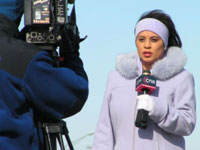Hamas restricts press
Gaza's Islamic Hamas rulers widened a crackdown on journalists after a mass rally by the rival Fatah movement ended in bloodshed earlier this week.

Hamas also said it planned to curb public gatherings.
The internal strife in Gaza has heated up as the Palestinians' moderate president, Mahmoud Abbas, tries to convince Israel and the world that he can negotiate an end to the Palestinian-Israeli conflict and preside over the formation of a Palestinian state. Abbas claims authority over Gaza, but wields little control there.
On Wednesday, Israel's Haaretz newspaper reported that Israel would declare a halt to West Bank settlement construction before a crucial peace summit with the Palestinians this month. A government spokeswoman would not confirm any report of a freeze.
Hamas, which violently seized control of Gaza in June, has taken swift action in the wake of this week's Fatah rally, which was by far the biggest challenge to the Islamic group since its takeover.
It arrested more than 400 Fatah loyalists after the rally, and in an edict published on its Web site Wednesday, it said journalists who do not hold official press cards from the Hamas-run Interior Ministry would not be allowed to work in Gaza. News organizations have resisted obtaining the cards because it entails submitting to restrictions, including a vague ban on stories that do not uphold "national responsibilities."
The restrictions were first enacted by Fatah in 1995 when it was in power, and used to crack down on Hamas at the time.
"The government will not allow any reporter or photographer to work unless they get the press card," Hamas said. "This decision came after the rally of the Fatah movement in which dozens of cameramen and photographers were observed, not working for any media organization, but using these cameras for political parties and for personal reasons."
Hamas did not say what action would be taken against journalists who do not comply.
Shortly after the restrictions were issued, Hamas police detained a cameraman for Germany's ARD TV.
The cameraman, Sawwah Abu Sayef, said he was filming in the southern Gaza town of Khan Younis when he was detained by Hamas police and escorted to the local police station.
"They asked me where my permit was, and asked me if I worked for Palestine TV," he said, referring to the government station run from the West Bank.
He said he was released after an hour.
Eight civilians were killed after Hamas security forces opened fire at Monday's rally of 250,000 Fatah supporters, including a man who died from his wounds on Wednesday. Hamas said Fatah opened fire first, a claim that has not been independently substantiated.
Interior Ministry spokesman Ihab Ghussen said Hamas was planning new, as yet undefined restrictions on "any rally, march or public event" in Gaza.
Hamas' effortsto cements its grip on Gaza coincides with efforts by Abbas and Israel to bridge differences ahead of a high-profile summit in the U.S. this month. The conference is aimed at relaunching peace talks and bolstering Abbas in his standoff with Hamas.
The U.S. has prodded Israel to announce a halt to settlement construction as a gesture to the Palestinians, to compensate for its refusal to include key issues in a peace deal blueprint that is to be presented at the gathering, the Haaretz newspaper said.
The Palestinians had hoped the blueprint would give some indication of how the two sides would resolve issues that have derailed past talks - final borders, sovereignty over disputed Jerusalem, and a solution for Palestinian refugees who lost their homes after Israel's 1948 creation.
Israel wants the document to be vague, but has promised to get into the nuts and bolts of the disputes after the conference.
A settlement freeze is a key element of the internationally backed "road map" peace plan, which the U.S. has been pressing both sides to begin implementing. The proposal stalled shortly after it was presented in 2003 because Israel continued building in settlements and the Palestinians didn't meet their obligation to disarm militants.
Israeli government spokeswoman Miri Eisin said "Israel is committed to fulfilling our side of the road map." However, she would not confirm whether Israel would halt settlement construction, even partially.
Haaretz said Olmert has sent top officials to Washington on Tuesday to work out the details of the freeze.
It said Olmert doesn't want the moratorium to apply to the large settlement blocs that Israel wants to keep under a peace deal. About three-quarters of Israel's 270,000 settlers live in these settlements, and most construction activity is going on there.
The road map demands a stop to all construction activity, but Israel has maintained it can build in large blocs to accommodate for the "natural growth" of the existing population.
Palestinian negotiator Saeb Erekat demanded that Israel respect its road map obligation. "Settlement activity must befrozen totally," Erekat said. "So no games."
The fate of disputed Jerusalem is another central issue in the decades-old conflict between Israel and the Palestinians. The Palestinians want east Jerusalem, which Israel annexed immediately after capturing it in 1967, to be capital of their hoped-for state.
Olmert has indicated willingness to transfer some Arab neighborhoods of the city to Palestinian sovereignty.
But on Wednesday, parliament handily gave initial approval to a bill that would require 80 of parliament's 120 lawmakers to approve territorial concessions on Jerusalem. Current law requires a simple majority of 61. The bill must pass three additional votes in parliament to become law.
Subscribe to Pravda.Ru Telegram channel, Facebook, RSS!





